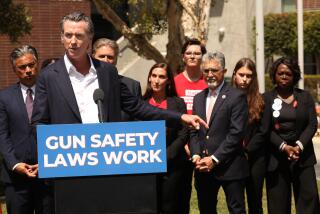An assault weapons ban was doomed. Focus on background checks.
WASHINGTON -- Earlier this month, I wrote that the Senate was making quiet progress toward passing a gun control bill that would make background checks mandatory on buyers in almost all gun purchases, including most sales between individuals. And that, I argued, would count as real progress toward more sensible gun regulation.
That’s still true today. Most of the headlines on gun control last week were about Senate Majority Leader Harry Reid (D-Nev.) ruling that an assault weapons ban won’t be in the bill that he brings up for debate on the Senate floor next month. Reid said the ban on military-style guns championed by Sen. Dianne Feinstein (D-Calif.) may have the support of about 40 senators, but it’s well short of a majority of 50. Feinstein can introduce an amendment to add the ban back onto the bill, but it looks as if it will mostly serve as an opportunity for centrist senators to vote against an idea they can denounce as a step too far, even as they vote in favor of less-draconian measures.
That makes background checks the main event: How universal will they be? (The leading version exempts sales among close relatives, but some would like to exempt any sale between two people who know each other – a rather difficult standard to enforce, it would seem.) And will they set up a system to keep a record of transactions, something police want (so they can enforce the law) but gun rights activists abhor (because they say it might turn into a national gun registry)? Background checks with no record-keeping sound pretty toothless, but some gun control advocates argue that they would be better than nothing. If a felon bought a gun from a private dealer, the dealer might be vulnerable to prosecution based on testimony from the felon – especially if the dealer was a repeat offender, with more than one felon testifying against him. No honor among thieves, as they say.
SLIDE SHOW: The 10 trigger-happiest states in America
Those details are still being hashed out by the bill’s chief author, Sen. Charles E. Schumer (D-N.Y.), and a revolving cast of Republicans who might be willing to sign on: Sen. Mark Kirk (R-Ill.), Sen. John McCain (R-Ariz.), Sen. Dean Heller (R-Nev.) and Sen. Tom Coburn (D-Okla.). (Coburn started the talks but is reported to have dug in his heels over the record-keeping issue.)
Whatever bill passes the Senate next month isn’t the last word, of course; it still has to get through the conservative-dominated House of Representatives. No Congress-watcher has ever believed that an assault weapons ban could survive in the House -- another reason background checks have become the main event.
Meanwhile, another intriguing phenomenon has appeared: New York Mayor Michael R. Bloomberg, who said on Sunday that his gun control organization plans to spend $12 million to put pressure on senators before they vote.
Bloomberg made it clear that background checks are the center of his gun control agenda too. “Ninety percent of the public … say that they think we should have reasonable checks before people are allowed to buy guns,’’ the mayor said on NBC’s “Meet the Press.” He said he was “cautiously optimistic” that Congress would follow public opinion on the issue.
That drew a fiery retort from Wayne LaPierre, chief executive of the National Rifle Assn., who accused Bloomberg of plotting to “buy America.”
“He can’t spend enough of his $27 billion to try to impose his will on the American public,” LaPierre said.
The NRA spent more than $32 million in the last two years to lobby Congress and influence elections, according to records compiled by the Center for Responsive Politics. So when LaPierre talks about someone trying to buy public opinion, he knows what he’s talking about.
ALSO:
McManus: Do-nothing Congress does something
Mailbag: Fuming over the Assault Weapons Ban’s Failure
4 million assault weapons in America: That should be enough
More to Read
A cure for the common opinion
Get thought-provoking perspectives with our weekly newsletter.
You may occasionally receive promotional content from the Los Angeles Times.







